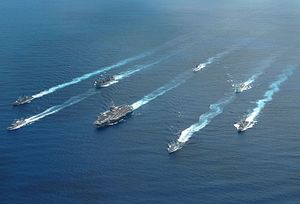This week is graduation week in Newport, and that means it’s Current Strategy Forum week in Newport. Household names have converged on the Naval War College. Yesterday, for instance, Robert Kaplan gave a tour d’horizon of Eurasian security before turning to the South China Sea, the subject of his latest book Asia’s Cauldron. The Naval Diplomat will have more to say about that tomorrow or Friday. Cyber whiz Peter Singer (Wired for War) addressed the gathering Wednesday morning, to equal acclaim.
Dominating stories coming out of the forum, though, was an exchange between Admiral Jonathan Greenert, the chief of naval operations—a.k.a. America’s top uniformed naval officer—and a student from our Intermediate Level Course. As USNI News‘s Sam LaGrone reports, the student asked how American naval professionals should discuss “tactics, techniques and procedures [on] how to counter Chinese ships and aircraft.” Should we do so in public? Admiral Greenert: “If you talk about it openly, you cross the line and unnecessarily antagonize.” Why be circumspect? Because “how much we trade with that country, it’s astounding.” Better to debate such matters in classified settings, deny that forcible-access strategies are aimed at China, and so forth.
Really? What we’re debating is the merits of speaking openly about challenges and, yes, threats — a threat being a prospective antagonist that combines capability with the resolve to use it in ways inimical to our, or our friends’, interests. And in a larger sense we’re debating how best to deter such an antagonist. This is Diplomacy 101.
For my money Henry Kissinger supplies the best definition of deterrence, depicting it as a product of our capability, our resolve, and — here’s Kissinger’s special ingredient — the opponent’s belief in our capability and our resolve to use it. That last element is the hub of the problem. If the opponent believes we can balk his strategy and will do so under certain circumstances, he’ll be deterred. But Kissinger goes to great lengths to stress that deterrence comes not from adding but from multiplying capability, resolve, and belief. That is, if any one factor is zero — if our capabilities are too few or ill-suited to the situation, if we waffle or appear to do so, or if the opponent pooh-poohs or misjudges our capabilities or determination — then deterrence is apt to fail.
So the U.S. military’s mission in the Western Pacific, China seas, and greater Indian Ocean is to keep each element of American maritime might strong. Conveying power and purpose to China is the crucial thing. How do we accomplish that? Let me strike a Solomonic pose on this question, and seek the golden mean. Candor with potential adversaries is critical, but it’s just as critical to avoid bluster. My hero Teddy Roosevelt sums it up with a pithy frontier maxim: don’t bluster, don’t flourish your revolver, and never draw unless you intend to shoot. In Kissinger’s terms, that’s a statement about communicating one’s intentions frankly but without needlessly giving offense, about clearly outlining the conditions that warrant reaching for the gun, and about actually following through should the opponent defy our terms. Capability, resolve, belief.
My go-to example of TR’s handling of deterrence comes from 1902, when the president dispatched Admiral Dewey and most of the U.S. Navy to the Caribbean Sea. Dewey’s assignment: to deter a combined European fleet from seizing territory from Venezuela during a quarrel over debt repayment. Roosevelt made it clear to European leaders that he was prepared to use force if they attempted a land grab contrary to the Monroe Doctrine. But he communicated his intentions in private, so as not to affront the prestige of Kaiser Wilhelm II and other statesmen. That reduced the chances of a showdown over a matter of honor. Here’s how effective TR was at keeping his deterrent efforts under wraps: historians squabbled about whether the U.S. naval deployment ever happened for a century afterward.
Therein lies wisdom. Both Admiral Greenert and our doughty NWC student have it partly right. Let’s abjure giving offense, and putting Beijing in high dudgeon in the process. Chest-thumping is neither necessary nor justified. American political and military representatives can confer candidly with their Chinese counterparts behind the scenes. Indeed, one hopes such exchanges are already happening. But at the same time, striking a diffident attitude in public bespeaks irresolution. Defending allies, and freedom of the seas and skies, is a permanent, nonnegotiable U.S. interest. That should be a constant refrain if Washington wants to instill belief in prospective opponents — or in allies and friends. So let’s be matter-of-fact about U.S. naval and air capability and the purposes that impel U.S. power.
Our Chinese friends are adults. Let’s not insult them by pretending that U.S. strategy-making is geared to some mythical opponent.

































